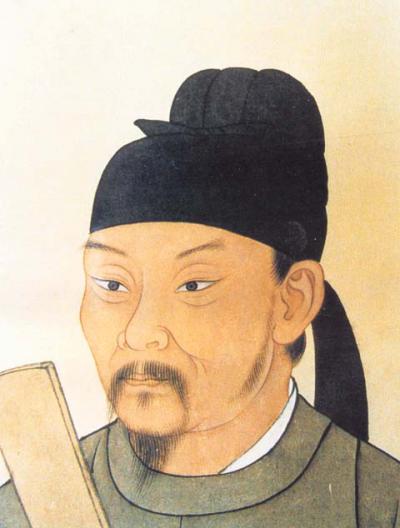Áfram stelpur
Traduzione cinese/ Chinese Translation: Sophia 林书砚
加油女孩
(continua)
(continua)
inviata da Sophia林书砚 27/1/2024 - 08:58
Запевала сојка птица
anonimo

Davide Barbarossa
一只松鸦鸟在唱歌 (continua)
inviata da Riccardo Gullotta 29/7/2023 - 22:23
Hallelujah, I'm a Bum

哈利路亚,我是个流浪汉
(continua)
(continua)
inviata da labor is the most glorious 13/2/2023 - 18:02
Warszawianka 1905 roku [Варшавянка; La Varsovienne; ¡A las barricadas!]
![Warszawianka 1905 roku [Варшавянка; La Varsovienne; ¡A las barricadas!]](img/thumb/c6506_130x140.jpeg?1328189496)
1u4. 华沙工人歌 [Huáshā gōngrén gē] - Altra versione cinese alternativa
1u4. 华沙工人歌 [Huáshā gōngrén gē] - Further Chinese alternative version
"It was sung with different lyrics from the source commonly known as the Chinese version. The lyrics themselves were already known in China." [Albatross795]
1u4. 华沙工人歌 [Huáshā gōngrén gē] - Further Chinese alternative version
"It was sung with different lyrics from the source commonly known as the Chinese version. The lyrics themselves were already known in China." [Albatross795]
华沙工人歌
(continua)
(continua)
inviata da Albatross795 30/11/2022 - 14:09
Carlos Puebla: Canción al Che, o Hasta siempre
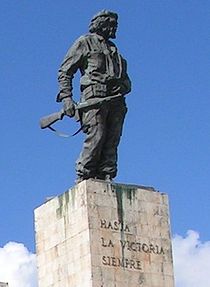
-->zh.wikipedia
直到永远,指挥官 [1]
(continua)
(continua)
inviata da Furio P. 12/10/2022 - 20:05
Άσμα ασμάτων
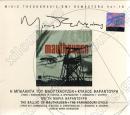
Yuan Jinquan (L. Trans.)
雅歌 [1]
(continua)
(continua)
inviata da Riccardo Venturi 11/10/2022 - 00:48
Махновщина [La Makhnovtchina]
anonimo
![Махновщина [La Makhnovtchina]](img/thumb/c3029_130x140.jpeg?1328356610)
Shvaulo (L. Trans.)
La Makhovscina in cinese, seppure in una traduzione da Lyricstranslate? Naturalmente si tratta di una modernissima traduzione (spedita al megasito globale delle traduzioni di canzoni e brani musicali nel 2019, addirittura da “Your doctor Sigmund Freud”, nientepopodimeno!) della versione francese, ma qualcosa in Cina dev'esser pur esistito. A tale riguardo si veda un'interessante tesi di laurea del 2013, della d.sa Anna Piana laureanda alla Ca' Foscari di Venezia, relativa al Movimento anarchico nella Cina Pre-repubblicana e Repubblicana. Buona lettura!
La Makhovscina in cinese, seppure in una traduzione da Lyricstranslate? Naturalmente si tratta di una modernissima traduzione (spedita al megasito globale delle traduzioni di canzoni e brani musicali nel 2019, addirittura da “Your doctor Sigmund Freud”, nientepopodimeno!) della versione francese, ma qualcosa in Cina dev'esser pur esistito. A tale riguardo si veda un'interessante tesi di laurea del 2013, della d.sa Anna Piana laureanda alla Ca' Foscari di Venezia, relativa al Movimento anarchico nella Cina Pre-repubblicana e Repubblicana. Buona lettura!
马赫诺行动
(continua)
(continua)
inviata da Riccardo Venturi 4/5/2022 - 10:56
Einheitsfrontlied
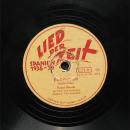
La traduzione ufficiale può essere trovata qui
http://www.jianpu.cn/pu/31/313382.htm
http://www.jianpu.cn/pu/31/313382.htm
工农的孩子
(continua)
(continua)
inviata da EinheitsBoreč 30/4/2022 - 16:05
Die Moorsoldaten [Börgermoorlied; Das Moorlied]
![Die Moorsoldaten [Börgermoorlied; Das Moorlied]](img/thumb/c971_130x140.jpeg?1328359947)
15. 沼泽士兵之歌 [Zhăozé shìbīng zhī gē] - Versione cinese
15. 沼泽士兵之歌 [Zhăozé shìbīng zhī gē] - Chinese version
Score and Lyrics
15. 沼泽士兵之歌 [Zhăozé shìbīng zhī gē] - Chinese version
Score and Lyrics
这里我们放眼望去, [1]
(continua)
(continua)
inviata da Albatross795 29/10/2021 - 15:49
Warszawianka 1905 roku [Варшавянка; La Varsovienne; ¡A las barricadas!]
![Warszawianka 1905 roku [Варшавянка; La Varsovienne; ¡A las barricadas!]](img/thumb/c6506_130x140.jpeg?1328189496)
1u3. 华沙工人歌 - Versione cinese alternativa
1u3. 华沙工人歌 - Alternative Chinese version
1u3. 华沙工人歌 - Alternative Chinese version
Equally from baike.baidu.com. This is another alternative version from a common stock of Chinese Warszawiankas, which are virtually interchangeable without altering the general meaning. [RV]
华沙工人歌
(continua)
(continua)
inviata da Boreč 29/10/2021 - 09:06
Warszawianka 1905 roku [Варшавянка; La Varsovienne; ¡A las barricadas!]
1u2. 华沙工人歌 (Versione cinese completa)
1u2. 华沙工人歌 (Complete Chinese version)
Note. The following version appears quite similar to 1u1, but complete with 3 stanzas plus refrain and slight differences in the lyrics. [RV]
1u2. 华沙工人歌 (Complete Chinese version)
此歌又名“华沙曲”“华沙革命曲”“华沙工人革命曲”等。
这首歌的曲调原是一首法国军歌《朱阿夫进行曲》(朱阿夫原指法国非洲殖民地远征军中的原住民士兵)1863年,侨居于巴黎的波兰诗人弗·沃尔斯基(1824~1882年)为其填词,献给了应募加入法国军队的波兰流亡者。这一年,华沙举行了反抗沙俄殖民统治的武装起义,这首进行曲便被命名为“华沙起义歌”。- baike.baidu.com
这首歌的曲调原是一首法国军歌《朱阿夫进行曲》(朱阿夫原指法国非洲殖民地远征军中的原住民士兵)1863年,侨居于巴黎的波兰诗人弗·沃尔斯基(1824~1882年)为其填词,献给了应募加入法国军队的波兰流亡者。这一年,华沙举行了反抗沙俄殖民统治的武装起义,这首进行曲便被命名为“华沙起义歌”。- baike.baidu.com
Note. The following version appears quite similar to 1u1, but complete with 3 stanzas plus refrain and slight differences in the lyrics. [RV]
华沙工人歌
(continua)
(continua)
inviata da Boreč 29/10/2021 - 09:02
We Shall Overcome

马列托主义者 (L. Trans.)
我们将胜利 [1]
(continua)
(continua)
inviata da Riccardo Venturi 22/1/2021 - 06:15
Der Himmel über Berlin [Lied vom Kindsein]
![Der Himmel über Berlin [Lied vom Kindsein]](img/upl/Kinde_14-_Himmel_uber_Berlin.jpg)
如鹿 [Rú lù]
童年之歌
(continua)
(continua)
inviata da Riccardo Gullotta 4/6/2020 - 22:55
义勇军进行曲
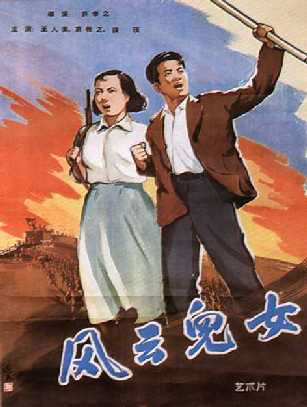
Yìyǒngjūn Jìnxíngqǔ
[1935]
电影 / Film / Movie / Elokuva :
徐兴志 [Xu Xingzhi ]
风云儿女 [Fēngyún érnǚ] / Sons and Daughters in a Time of Storm / Enfants de Chine :
诗/ Poesia / A Poem by / Poésie / Runo:
田汉 / Tian Han
音乐作曲家 / Musica / Music / Musique / Sävel:
聂耳 /Nie Er
Premesso che qualche inno può suscitare delle emozioni (sono concepiti a bella posta), chi scrive li guarda con malcelata diffidenza così come le bandiere. Le pulsioni identitarie, piuttosto che innaffiare l’orto dei valori della convivenza, finiscono per ingrossare sia le fila dei comburenti per gli scannatoi delle civiltà sia il parco degli agenti patogeni, aka virus, delle democrazie libertarie.
Nella fattispecie però gli accadimenti correlati all’inno potrebbero dare l’estro ad uno scrittore nostrano per un romanzo dopo averli filtrati ed elaborati in forma e linguaggio occidentali. Si tratta infatti di un caso unico,... (continua)
[1935]
电影 / Film / Movie / Elokuva :
徐兴志 [Xu Xingzhi ]
风云儿女 [Fēngyún érnǚ] / Sons and Daughters in a Time of Storm / Enfants de Chine :
诗/ Poesia / A Poem by / Poésie / Runo:
田汉 / Tian Han
音乐作曲家 / Musica / Music / Musique / Sävel:
聂耳 /Nie Er
Premesso che qualche inno può suscitare delle emozioni (sono concepiti a bella posta), chi scrive li guarda con malcelata diffidenza così come le bandiere. Le pulsioni identitarie, piuttosto che innaffiare l’orto dei valori della convivenza, finiscono per ingrossare sia le fila dei comburenti per gli scannatoi delle civiltà sia il parco degli agenti patogeni, aka virus, delle democrazie libertarie.
Nella fattispecie però gli accadimenti correlati all’inno potrebbero dare l’estro ad uno scrittore nostrano per un romanzo dopo averli filtrati ed elaborati in forma e linguaggio occidentali. Si tratta infatti di un caso unico,... (continua)
起來!不願做奴隸的人們![1]
(continua)
(continua)
inviata da Riccardo Gullotta 12/4/2020 - 20:32
站在草原望北京
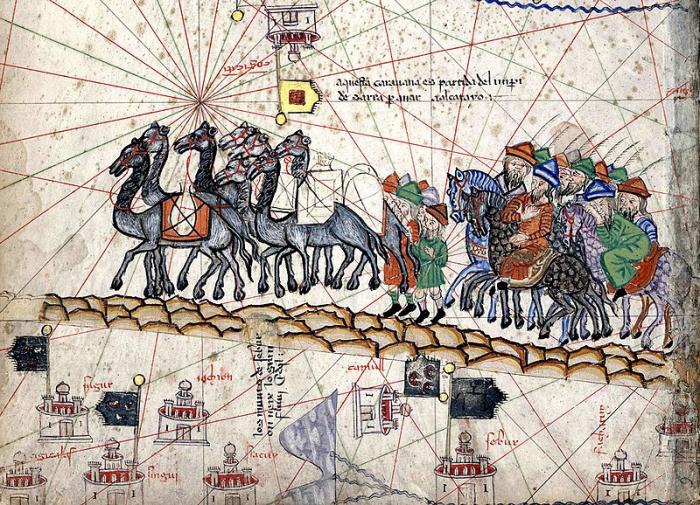
Zhan Zai Cao Yuan Wang Bei Jing
[2012]
歌词 / Testo / Lyrics / Paroles / Sanat:
Qiu Guo Dong [邱国栋]
音乐作曲家 /Musica / Music / Musique / Sävel:
Zhang Tian Fu [张天赋]
歌手/ Interpreti / Performed by / Interprétée par / Laulavat:
Wu Lan Tu Ya [乌兰图雅]
da Il Milione di Marco Polo, cap. 68
…Da che ò cominciato de' Tartari, sí ve ne dirò molte cose. […]E per niuna cosa l'uomo non toccarebbe la moglie de l'altro, però che l'ànno per malvagia cosa e per grande villania. Le donne sono buone e guarda benel'onore de' l[oro] signori, e governano bene tutta la famiglia. Ciascheuno puote pigliare tante mogli quant'egli vuole infino in 100, se egli àe da poterle mantenere; l'uomo dàe a la mad(r)e della femina, e la femina non dà nulla a l’uomo, ma ànno per migliore e per piú veritier[a] la prima moglie che l'altre. Egli ànno piú figliuoli che... (continua)
[2012]
歌词 / Testo / Lyrics / Paroles / Sanat:
Qiu Guo Dong [邱国栋]
音乐作曲家 /Musica / Music / Musique / Sävel:
Zhang Tian Fu [张天赋]
歌手/ Interpreti / Performed by / Interprétée par / Laulavat:
Wu Lan Tu Ya [乌兰图雅]
da Il Milione di Marco Polo, cap. 68
…Da che ò cominciato de' Tartari, sí ve ne dirò molte cose. […]E per niuna cosa l'uomo non toccarebbe la moglie de l'altro, però che l'ànno per malvagia cosa e per grande villania. Le donne sono buone e guarda benel'onore de' l[oro] signori, e governano bene tutta la famiglia. Ciascheuno puote pigliare tante mogli quant'egli vuole infino in 100, se egli àe da poterle mantenere; l'uomo dàe a la mad(r)e della femina, e la femina non dà nulla a l’uomo, ma ànno per migliore e per piú veritier[a] la prima moglie che l'altre. Egli ànno piú figliuoli che... (continua)
瓦蓝蓝的天上飞雄鹰 [1]
(continua)
(continua)
inviata da Riccardo Gullotta 9/4/2020 - 23:08
Bella Ciao
anonimo

19b. 啊朋友再见 (Traduzione cinese letterale del canto partigiano)
19b. 啊朋友再见 (A Chinese literal translation of the partisan song)
19b. 啊朋友再见 (A Chinese literal translation of the partisan song)
一天早晨我醒来
(continua)
(continua)
inviata da Riccardo Venturi 16/2/2020 - 07:51
Where Have all the Flowers Gone

CINESE/CHINESE/CHINOIS [1]
Poon Sow Keng [Pan Xiuqiong]
Versione cinese di Poon Sow Keng [Pan Xiuqiong 潘秀瓊] (1964)
Chinese version by Poon Sow Keng [Pan Xiuqiong 潘秀瓊] (1964)
Version chinoise de Poon Sow Keng [Pan Xiuqiong 潘秀瓊] (1964)
Nata cittadina portoghese a Macao nel 1935, Poon Sow Keng (Pan Xiuqiong) è stata una delle più acclamate artiste di lingua cinese e cantonese.
Poon Sow Keng [Pan Xiuqiong]
Versione cinese di Poon Sow Keng [Pan Xiuqiong 潘秀瓊] (1964)
Chinese version by Poon Sow Keng [Pan Xiuqiong 潘秀瓊] (1964)
Version chinoise de Poon Sow Keng [Pan Xiuqiong 潘秀瓊] (1964)
Nata cittadina portoghese a Macao nel 1935, Poon Sow Keng (Pan Xiuqiong) è stata una delle più acclamate artiste di lingua cinese e cantonese.
花儿怎么不见了?
(continua)
(continua)
inviata da Riccardo Venturi 18/1/2020 - 01:55
Η σονάτα του σεληνόφωτος
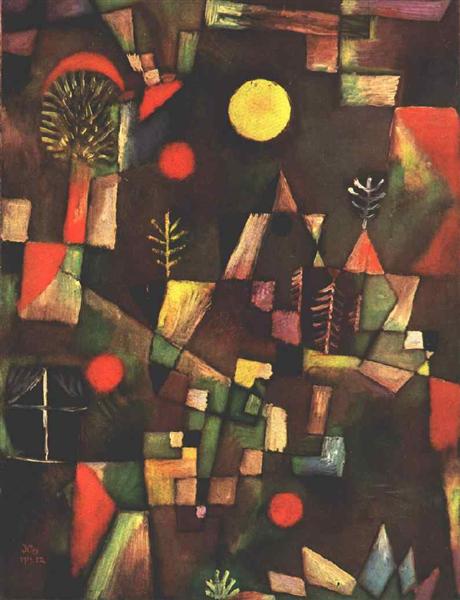
Jiang Haizhou / 姜海洲
Il primo movimento della Sonata nell’interpretazione del celebre pianista Alfred Brendel :
Il primo movimento della Sonata nell’interpretazione del celebre pianista Alfred Brendel :
Yuèguāng zòumíngqǔ / 月光奏鸣曲
(continua)
(continua)
inviata da Riccardo Gullotta 9/12/2019 - 23:52
L'Internationale

CINESE ANTICO [VII-II secolo a.C.] / OLD CHINESE [7th to 2nd century b.C.]
"Old Chinese is the ancestor of all modern Chinese dialects, which was spoken in the 7th to 2nd century BC (during the Spring and Autumn Periods, and the Warring States Period). Unlike Middle Chinese, there are many different reconstructions in Old Chinese as scholars are unable to reach a consensus, even though scholars have worked on Old Chinese for the last century. This is due to the limited amount of evidence available such as rhyming patterns in the Book of Poetry (Shijing)." - John Williams
Per quanto possa sembrare incredibile, fin dagli anni '30 del XX secolo i sinologi (e mi riferisco in particolare allo svedese Bernhard Karlgren) portano avanti sistematici tentativi di ricostruzione del cinese antico, vale a dire -in linea di massima- la lingua scritta e parlata tra il cosiddetto “Periodo dell'Autunno... (continua)
"Old Chinese is the ancestor of all modern Chinese dialects, which was spoken in the 7th to 2nd century BC (during the Spring and Autumn Periods, and the Warring States Period). Unlike Middle Chinese, there are many different reconstructions in Old Chinese as scholars are unable to reach a consensus, even though scholars have worked on Old Chinese for the last century. This is due to the limited amount of evidence available such as rhyming patterns in the Book of Poetry (Shijing)." - John Williams
Per quanto possa sembrare incredibile, fin dagli anni '30 del XX secolo i sinologi (e mi riferisco in particolare allo svedese Bernhard Karlgren) portano avanti sistematici tentativi di ricostruzione del cinese antico, vale a dire -in linea di massima- la lingua scritta e parlata tra il cosiddetto “Periodo dell'Autunno... (continua)
[ qɯ:l ɂslɯ ra:wɂ gro:ns qaŋ grɯb mlans gʷa:ɂ
(continua)
(continua)
inviata da Riccardo Venturi 19/9/2019 - 05:11
广场 (The Square)
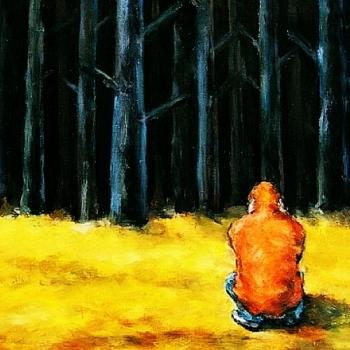
2007
Mr. Van Gogh (梵高先生)
Il cantante pop-rock cinese Li Zhi è sparito nel nulla
E, da tre mesi a questa parte, anche le sue canzoni sono scomparse dal web, si pensa che sia per "colpa" di alcuni sui pezzi troppo schierati
PECHINO - Sono passati circa tre mesi dalla "sparizione" del musicista rock cinese Li Zhi: un tour nello Sichuan è stato cancellato a febbraio e i suoi account sui vari social media sono stati chiusi.
Inoltre, la sua musica è stata rimossa dai principali siti di streaming cinesi ed è quasi come se il folk rocker quarantenne di Changzou, nello Jiangsu, non fosse mai esistito provando a navigare su internet in mandarino.
Nel 30/o anniversario dei tragici fatti di Tiananmen, Li ha avuto la "responsabilità" d'aver toccato temi sociali dando voce a un malessere diffuso, malgrado la poderosa avanzata economica e geopolitica del Dragone, arrivando ad affrontare il tema... (continua)
Mr. Van Gogh (梵高先生)
Il cantante pop-rock cinese Li Zhi è sparito nel nulla
E, da tre mesi a questa parte, anche le sue canzoni sono scomparse dal web, si pensa che sia per "colpa" di alcuni sui pezzi troppo schierati
PECHINO - Sono passati circa tre mesi dalla "sparizione" del musicista rock cinese Li Zhi: un tour nello Sichuan è stato cancellato a febbraio e i suoi account sui vari social media sono stati chiusi.
Inoltre, la sua musica è stata rimossa dai principali siti di streaming cinesi ed è quasi come se il folk rocker quarantenne di Changzou, nello Jiangsu, non fosse mai esistito provando a navigare su internet in mandarino.
Nel 30/o anniversario dei tragici fatti di Tiananmen, Li ha avuto la "responsabilità" d'aver toccato temi sociali dando voce a un malessere diffuso, malgrado la poderosa avanzata economica e geopolitica del Dragone, arrivando ad affrontare il tema... (continua)
韩东方 工人:
(continua)
(continua)
inviata da Dq82 + adriana 4/6/2019 - 17:49
Percorsi:
Piazza Tien An Men, 1989
El pueblo unido jamás será vencido

Chinese translation by Liu Yuen from zhihu.com
中文翻译:刘源
中文翻译:刘源
《團結的人民永不被擊潰》(西班牙语:El pueblo unido jamás será vencido, 西班牙語發音:[el ˈpweβlo uˈniðo xaˈmas seˈɾa βenˈsiðo])是由1948年被刺殺的哥倫比亞政治家豪尔赫·埃利泽·盖坦所說的一句格言,而後由智利的作曲家Sergio Ortega改寫為歌曲,由智利的音樂團體Quilapayún 錄製專輯。智利社會主義政治組織人民團結陣線活動時經常使用該歌曲。在1973年智利政變後,智利樂團Inti-Illimani的演唱使這首歌舉世聞名。- zh.wikipedia
团结的人民永远不被击溃!
(continua)
inviata da Dq82 23/6/2018 - 13:58
Warszawianka 1905 roku [Варшавянка; La Varsovienne; ¡A las barricadas!]
![Warszawianka 1905 roku [Варшавянка; La Varsovienne; ¡A las barricadas!]](img/thumb/c6506_130x140.jpeg?1328189496)
1u1. 華沙工人進行曲(華沙工人歌), La versione cinese
1u1. 華沙工人進行曲(華沙工人歌), The Chinese version
La versione cinese appare regolarmente come formata da due brevi quartine, una strofa e un ritornello; ma, spesso (come nel video) si esegue soltanto la musica, con andamento piuttosto da marcia militare. Le due quartine riproducono peraltro bene sia le “parole d'ordine” della Warszawianka, sia di !A las barricadas!, ma ovviamente senza le barricate:
Il fuoco del nemico ci urlò sulla, testa.
Le forze oscure stanno ancora ruggendo.
Combattiamo con il nemico,
Chiunque vinca aspetta la nostra risposta.
Andando fieramente e avanzando coraggiosamente
Alza lo stendardo della liberazione dei lavoratori!
Alzalo in alto, alza lo stendardo del combattimento,
Combatti per il futuro dell'umanità!
The Chinese version appears regularly as formed by two short quatrains, a verse and a refrain; but often (as in the video)... (continua)
1u1. 華沙工人進行曲(華沙工人歌), The Chinese version
La versione cinese appare regolarmente come formata da due brevi quartine, una strofa e un ritornello; ma, spesso (come nel video) si esegue soltanto la musica, con andamento piuttosto da marcia militare. Le due quartine riproducono peraltro bene sia le “parole d'ordine” della Warszawianka, sia di !A las barricadas!, ma ovviamente senza le barricate:
Il fuoco del nemico ci urlò sulla, testa.
Le forze oscure stanno ancora ruggendo.
Combattiamo con il nemico,
Chiunque vinca aspetta la nostra risposta.
Andando fieramente e avanzando coraggiosamente
Alza lo stendardo della liberazione dei lavoratori!
Alzalo in alto, alza lo stendardo del combattimento,
Combatti per il futuro dell'umanità!
The Chinese version appears regularly as formed by two short quatrains, a verse and a refrain; but often (as in the video)... (continua)
敵人的烽火在頭上吼叫,[1]
(continua)
(continua)
inviata da Riccardo Venturi 20/4/2018 - 14:20
Warszawianka 1905 roku [Варшавянка; La Varsovienne; ¡A las barricadas!]
1u. Traduzione cinese (con trascrizione)
1u. Chinese translation (with transcription)
华沙工人歌
"此歌又名“华沙曲”“华沙**曲”“华沙工人**曲”等。
这首歌的曲调原是一首法国军歌《朱阿夫进行曲》(朱阿夫原指法国非洲殖民地远征军中的原住民士兵)1863年,侨居于巴黎的波兰诗人弗.沃尔斯基(1824~1882年)为其填词,献给了应募加入法国军队的波兰流亡者。这一年,华沙举行了反抗沙俄殖民统治的武装起义,这首进行曲便被命名为“华沙起义歌”。1878年,被囚禁于华沙城堡的的波兰**诗人伐茨拉夫.斯文契斯基(1848~1900年)有一次听到隔壁牢房的狱友在唱《华沙起义歌》,就采用这一曲调重新填写了新歌词,他把歌词用针尖戳录在书页上。书后来被带到狱外,他的同志们摸着针眼,记下了歌词。1883年,斯文契斯基称之为《华沙曲》的歌曲在波兰地下报刊《无产者》第1期上登出,立刻在**者圈子中流传开来。1895年,彼得堡“工人阶级解放与斗争协会”的一个小组被捕,其中有格奥尔基.克尔日扎诺夫斯基。他们被囚禁在布蒂尔卡监狱,同牢房有几名波兰社会主义党的“要犯”,他们经常唱《华沙曲》。克尔日扎诺夫斯基回忆说:“歌曲很出色,但是我们俄国**者不会唱,因为我们不懂波兰语。我想写一首俄语版的《华沙曲》,于是波兰同志们便把歌词直译过来,我重新填写了歌词。凡是没有无产阶级觉悟的语句,我们都抛弃了,力求使歌曲充实无产阶级**的内容。”1897年春天,沙俄当局准备把关押在布蒂尔卡监狱的一批政治犯流放到西伯利亚去,突然,整个监狱都唱起了“仇恨的风在头上咆哮怒吼.......”狱卒们扑向牢房,但是被囚犯们顶住了,一直到歌曲唱完。-----------这是俄语版《华沙工人歌》的第一次“战斗洗礼”。同波兰语原曲相比,俄语版的《华沙工人歌》不仅歌词内容大不相同,而且曲调`节奏乃至于风格都有了较大的改动。1902年,俄罗斯**报刊《火星报》出版的第一部俄罗斯**歌曲集刊登了俄语版的《华沙工人歌》,两三年之后,《华沙工人歌》传遍了俄罗斯全国各地。1917年4月3日,列宁结束流亡生活,回到俄国来领导社会主义**。同志们正是唱着《华沙工人歌》来迎接他的。"
1u. Chinese translation (with transcription)
Da questa pagina; il testo è stato rimodellato in versi. La trascrizione pinyin è stata ottenuta tramite Google Translator.
The Chinese translated lyrics are reproduced from this page and shown here in verse layout. The pinyin transcription is through Google Translator.
The Chinese translated lyrics are reproduced from this page and shown here in verse layout. The pinyin transcription is through Google Translator.
华沙工人歌
"此歌又名“华沙曲”“华沙**曲”“华沙工人**曲”等。
这首歌的曲调原是一首法国军歌《朱阿夫进行曲》(朱阿夫原指法国非洲殖民地远征军中的原住民士兵)1863年,侨居于巴黎的波兰诗人弗.沃尔斯基(1824~1882年)为其填词,献给了应募加入法国军队的波兰流亡者。这一年,华沙举行了反抗沙俄殖民统治的武装起义,这首进行曲便被命名为“华沙起义歌”。1878年,被囚禁于华沙城堡的的波兰**诗人伐茨拉夫.斯文契斯基(1848~1900年)有一次听到隔壁牢房的狱友在唱《华沙起义歌》,就采用这一曲调重新填写了新歌词,他把歌词用针尖戳录在书页上。书后来被带到狱外,他的同志们摸着针眼,记下了歌词。1883年,斯文契斯基称之为《华沙曲》的歌曲在波兰地下报刊《无产者》第1期上登出,立刻在**者圈子中流传开来。1895年,彼得堡“工人阶级解放与斗争协会”的一个小组被捕,其中有格奥尔基.克尔日扎诺夫斯基。他们被囚禁在布蒂尔卡监狱,同牢房有几名波兰社会主义党的“要犯”,他们经常唱《华沙曲》。克尔日扎诺夫斯基回忆说:“歌曲很出色,但是我们俄国**者不会唱,因为我们不懂波兰语。我想写一首俄语版的《华沙曲》,于是波兰同志们便把歌词直译过来,我重新填写了歌词。凡是没有无产阶级觉悟的语句,我们都抛弃了,力求使歌曲充实无产阶级**的内容。”1897年春天,沙俄当局准备把关押在布蒂尔卡监狱的一批政治犯流放到西伯利亚去,突然,整个监狱都唱起了“仇恨的风在头上咆哮怒吼.......”狱卒们扑向牢房,但是被囚犯们顶住了,一直到歌曲唱完。-----------这是俄语版《华沙工人歌》的第一次“战斗洗礼”。同波兰语原曲相比,俄语版的《华沙工人歌》不仅歌词内容大不相同,而且曲调`节奏乃至于风格都有了较大的改动。1902年,俄罗斯**报刊《火星报》出版的第一部俄罗斯**歌曲集刊登了俄语版的《华沙工人歌》,两三年之后,《华沙工人歌》传遍了俄罗斯全国各地。1917年4月3日,列宁结束流亡生活,回到俄国来领导社会主义**。同志们正是唱着《华沙工人歌》来迎接他的。"
华沙工人歌 [1]
(continua)
(continua)
inviata da Riccardo Venturi 20/4/2018 - 01:11
נרקוד לשלום

25. CINESE / Chinese
Traduttore sconosciuto / Unknown Translator
NOTA. Nel sito originale, il nome del traduttore cinese non è specificato. E' stata aggiunta una trascrizione Pinyin ottenuta mediante Google Translator (notoriamente esattissimo e affidabile per le trascrizioni).
NOTE. The Chinese translator's name is not shown in the original site. A Pinyin transcription has been added by help of Google Translator (notoriously very exact and reliable for transcriptions).
Traduttore sconosciuto / Unknown Translator
NOTA. Nel sito originale, il nome del traduttore cinese non è specificato. E' stata aggiunta una trascrizione Pinyin ottenuta mediante Google Translator (notoriamente esattissimo e affidabile per le trascrizioni).
NOTE. The Chinese translator's name is not shown in the original site. A Pinyin transcription has been added by help of Google Translator (notoriously very exact and reliable for transcriptions).
我们为和平而起舞 [1]
(continua)
(continua)
inviata da Riccardo Venturi 26/8/2017 - 08:30
Tao Te Ching: XXXI
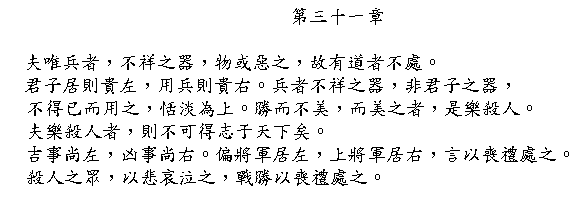
Il Daodejing (道德經T, 道德经S, Pinyin:Dàodéjīng, Wade-Giles: Tao Te Ching «Libro della Via e della Virtù») è un testo cinese di prosa talvolta rimata, la cui composizione risale a un periodo compreso tra il IV e il III secolo a.C.
Il testo è stato musicato nella sua traduzione italiana da Daisy Lumini e Beppe Chierici
Il testo è stato musicato nella sua traduzione italiana da Daisy Lumini e Beppe Chierici
第三十一章
(continua)
(continua)
inviata da Dq82 28/7/2017 - 16:19
Sámi soga lávlla

14. Traduzione cinese di Jo Hyo-roe
14. Chinese translation by Jo Hyo-roe
14. Chinese translation by Jo Hyo-roe
Fonte / Source : National Anthems Forum
萨米民族区域颂歌
(continua)
(continua)
inviata da Riccardo Venturi 12/12/2016 - 15:52
Ragazza di Nanchino

La traduzione è accompagnata da una traslitterazione pínyìn, ma senza indicazione dei toni. [RV]
南京姑娘
(continua)
(continua)
inviata da Dq82 12/7/2016 - 18:14
Красная Армия всех сильней (Белая Армия, Чёрный Барон)

红军最强大
(continua)
(continua)
inviata da Riccardo Venturi 6/5/2016 - 22:10
Where Have all the Flowers Gone

CINESE / CHINESE / CHINOIS [2]
Versione cinese “schematica” presente in decine di siti.
A “schematic” Chinese translation included in dozens of websites.
Traduction chinoise “schématique” présente dans de très nombreux sites.
In molti siti si trova questa traduzione “schematica” accompagnata quasi invariabilmente dall'articoletto di zh.wikipedia. Lo schema è elementare: “Dove sono finiti tutti i fiori? Li hanno presi le ragazze. Dove sono finite tutte le ragazze? Sono andate a sposare gli uomini.” E così via, fino alle tombe ricoperte di fiori. [RV]
Versione cinese “schematica” presente in decine di siti.
A “schematic” Chinese translation included in dozens of websites.
Traduction chinoise “schématique” présente dans de très nombreux sites.
In molti siti si trova questa traduzione “schematica” accompagnata quasi invariabilmente dall'articoletto di zh.wikipedia. Lo schema è elementare: “Dove sono finiti tutti i fiori? Li hanno presi le ragazze. Dove sono finite tutte le ragazze? Sono andate a sposare gli uomini.” E così via, fino alle tombe ricoperte di fiori. [RV]
花儿都到哪里去了?
(continua)
(continua)
inviata da Riccardo Venturi 15/3/2016 - 12:00
L'Internationale

CINESE CLASSICO (Wènyán) / CLASSICAL CHINESE (Wènyán)
La seguente versione in cinese classico (wényán wén) è tratta dalla edizione Wikipedia in cinese classico ed è preceduta da una breve introduzione. Sebbene oramai abbandonato da parecchi decenni come lingua ufficiale, il cinese classico è ancora parte importante dell'eredità culturale del Paese e ha attualmente, in pratica, la funzione del latino nei paesi occidentali.
The following Classical Chinese (wényán wén) version is reproduced from the Classical Chinese Wikipedia and is provided with a short introduction. Though not more used since decades as the official Language of China, Classical Chinese is still an important part of the country's cultural heritage and has now, in practice, the same function as Latin in Western countries. [CCG/AWS Staff]
國際歌者,蓋一八七一年,由巴黎公社之委員歐仁鮑迪埃作詞,共產黨人迪蓋特作曲也。世界之行社會主義者,共產主義者,無政府主義者,咸誦此歌。其為第一國際及第二國際之會歌。蘇聯嘗以之為國歌,達二十七年之久。瞿秋白譯之於中文。後,秋白為國民黨所誅,臨刑之時,誦之而死。譯文如下:
The following Classical Chinese (wényán wén) version is reproduced from the Classical Chinese Wikipedia and is provided with a short introduction. Though not more used since decades as the official Language of China, Classical Chinese is still an important part of the country's cultural heritage and has now, in practice, the same function as Latin in Western countries. [CCG/AWS Staff]
國際歌者,蓋一八七一年,由巴黎公社之委員歐仁鮑迪埃作詞,共產黨人迪蓋特作曲也。世界之行社會主義者,共產主義者,無政府主義者,咸誦此歌。其為第一國際及第二國際之會歌。蘇聯嘗以之為國歌,達二十七年之久。瞿秋白譯之於中文。後,秋白為國民黨所誅,臨刑之時,誦之而死。譯文如下:
國際歌 [1]
(continua)
(continua)
inviata da Riccardo Venturi 2/12/2015 - 02:23
Lili Marleen [Lied eines jungen Wachtpostens]
![Lili Marleen [Lied eines jungen Wachtpostens]](img/thumb/c1600_130x140.jpeg?1328915965)
CINESE / CHINESE [1] - zh.wikipedia
La versione letterale cinese presente su zh.wikipedia, dalla quale è ripreso anche il commento. La trascrizione pinyin è effettuata mediante il tool di Google Translator.
The literal Chinese translation available from zh.wikipedia. The introduction is reproduced from the same page. Pinyin transcription made by using Google Translator tool. [CCG/AWS Staff]
歌詞由漢斯·萊普(Hans Leip 1893-1983)寫於一次大戰中的1915年,他當時是一名被徵召到德軍俄國前線的漢堡教師。Leip組合了他女朋友與另一名女性朋友的名稱,即莉莉與瑪蓮,詩意地組合了莉莉瑪蓮這一個人名。這首詩题为"Das Mädchen unter der Laterne"(德語:〈路燈下的女孩〉),收入在1937年出版的名为《Die kleine Hafenorgel》的诗集中。1938年作曲家诺伯特·舒尔策(Norbert Schultze)为这首诗谱曲,改名为"Das Lied eines jungen Soldaten auf der Wacht"(《一個年輕的士兵值班之歌》)。原本是为男歌手写的歌曲,舒尔策先送给一位有名的男高音歌唱家,这位歌唱家认为歌曲太简单,拒绝演唱。后来舒尔策又找夜总会歌手拉莉·安德森演唱,并在1939年灌制了唱片,但是由于战争爆发,唱片只出售700张。
1941年德军占领南斯拉夫,德军在贝尔格莱德开设德军广播电台,覆盖南欧和北非地区。8月18日,电台从一些废弃的唱片中找到这首德国歌曲播放,不久收到许多前线士兵来信要求重播这首歌曲。贝尔格莱德电台重播了《莉莉瑪蓮》,随后其他地区的德军电台也播放这首歌曲。由于帝国元帅格林欣赏拉莉·安德森的演唱,于是这首歌也在德国后方广为流传起来。但是纳粹宣传部长約瑟夫·戈培爾不喜欢这首歌,认为是靡靡之音,瓦解士兵斗志。1943年德军在斯大林格勒战役失败之后,戈培爾下令禁止演唱这首歌。
然而在北非的英国老兵也喜欢上了这首德国歌曲,并带回英国。1942年,英国诗人Tommy... (continua)
La versione letterale cinese presente su zh.wikipedia, dalla quale è ripreso anche il commento. La trascrizione pinyin è effettuata mediante il tool di Google Translator.
The literal Chinese translation available from zh.wikipedia. The introduction is reproduced from the same page. Pinyin transcription made by using Google Translator tool. [CCG/AWS Staff]
歌詞由漢斯·萊普(Hans Leip 1893-1983)寫於一次大戰中的1915年,他當時是一名被徵召到德軍俄國前線的漢堡教師。Leip組合了他女朋友與另一名女性朋友的名稱,即莉莉與瑪蓮,詩意地組合了莉莉瑪蓮這一個人名。這首詩题为"Das Mädchen unter der Laterne"(德語:〈路燈下的女孩〉),收入在1937年出版的名为《Die kleine Hafenorgel》的诗集中。1938年作曲家诺伯特·舒尔策(Norbert Schultze)为这首诗谱曲,改名为"Das Lied eines jungen Soldaten auf der Wacht"(《一個年輕的士兵值班之歌》)。原本是为男歌手写的歌曲,舒尔策先送给一位有名的男高音歌唱家,这位歌唱家认为歌曲太简单,拒绝演唱。后来舒尔策又找夜总会歌手拉莉·安德森演唱,并在1939年灌制了唱片,但是由于战争爆发,唱片只出售700张。
1941年德军占领南斯拉夫,德军在贝尔格莱德开设德军广播电台,覆盖南欧和北非地区。8月18日,电台从一些废弃的唱片中找到这首德国歌曲播放,不久收到许多前线士兵来信要求重播这首歌曲。贝尔格莱德电台重播了《莉莉瑪蓮》,随后其他地区的德军电台也播放这首歌曲。由于帝国元帅格林欣赏拉莉·安德森的演唱,于是这首歌也在德国后方广为流传起来。但是纳粹宣传部长約瑟夫·戈培爾不喜欢这首歌,认为是靡靡之音,瓦解士兵斗志。1943年德军在斯大林格勒战役失败之后,戈培爾下令禁止演唱这首歌。
然而在北非的英国老兵也喜欢上了这首德国歌曲,并带回英国。1942年,英国诗人Tommy... (continua)
莉莉瑪蓮
(continua)
(continua)
inviata da Riccardo Venturi 19/4/2014 - 09:44
Blowin' in the Wind

CINESE / CHINESE [Qiu Sheng / Huan Ho Yi - 仇晟 黄枘 何易 译]
Una traduzione cinese (in caratteri semplificati) proveniente da questa pagina. Il titolo che in cinese è stato dato alla canzone è "The Answer Blowing in the Wind": la lingua cinese non permetterebbe di fare altrimenti. La traduzione sembra essere opera di Qiu Sheng e Huang Ho Yi (仇晟 黄枘 何易 译), come indicato in calce al testo. [RV]
答案在风中飘荡 [1]
(continua)
(continua)
inviata da Riccardo Venturi 18/1/2014 - 08:23
རྒྱལ་གླུ། [༄༄། བོད་རྒྱལ་ཁབ་ཀྱི་རྒྱལ་གླུ།] [Gyallu; Rgyal·glu]
![རྒྱལ་གླུ། [༄༄། བོད་རྒྱལ་ཁབ་ཀྱི་རྒྱལ་གླུ།] [Gyallu; Rgyal·glu]](img/thumb/c5236_130x140.jpeg?1328562244)
译文
(zh.wikipedia)
(zh.wikipedia)
L'esecuzione e anche il semplice canto dell'inno nazionale tibetano sono severamente proibiti nella Repubblica Popolare Cinese. Del resto, anche la consultazione della Wikipedia in cinese è proibita nella Repubblica Popolare Cinese. [CCG/AWS Staff]
有寂利乐妙源宝藏
(continua)
(continua)
inviata da Riccardo Venturi 14/1/2014 - 17:22
Катюша

CINESE / CHINESE [2]
在中國《喀秋莎》被翻譯成中文,由趙風填詞。 - zh.wikipedia
La traduzione cinese artistica di Zhao Li
Zhao Li's Chinese "artistic" translation
La traduzione cinese artistica di Zhao Li
Zhao Li's Chinese "artistic" translation
中文歌詞
(continua)
(continua)
inviata da RV 4/10/2013 - 23:50
一块红布 (A piece of red cloth)
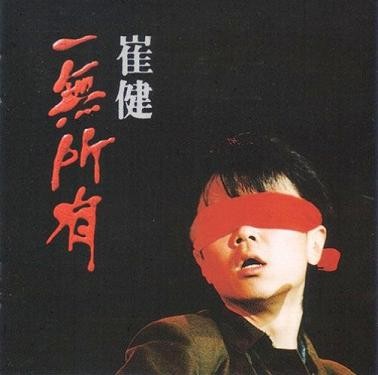
1989 - 新长征路上的摇滚 (Rock 'N' Roll On The New Long March)
Cui Jian reached the apex of his popularity during the Tiananmen Square protests of 1989, when "Nothing to My Name" became an anthem to student protestors. Before the protests were violently broken up on 4–5 June, Cui frequently appeared with the students and was affirmed by Wu'er Kaixi, one of the prominent leaders of the movement, as highly influential among young Chinese of the time. The following government crackdown forced many rock musicians, Cui Jian included, into hiding in the other provinces. Sanctions proved relatively temporary and Cui was able to return to Beijing shortly afterward. In early 1990, he began his first rock tour entitled the "New Long March", with ten concerts scheduled in Zhengzhou, Wuhan, Xi'an, Chengdu and others. Midway through the tour, Cui Jian gained notoriety for appearing on stage wearing a red blindfold... (continua)
Cui Jian reached the apex of his popularity during the Tiananmen Square protests of 1989, when "Nothing to My Name" became an anthem to student protestors. Before the protests were violently broken up on 4–5 June, Cui frequently appeared with the students and was affirmed by Wu'er Kaixi, one of the prominent leaders of the movement, as highly influential among young Chinese of the time. The following government crackdown forced many rock musicians, Cui Jian included, into hiding in the other provinces. Sanctions proved relatively temporary and Cui was able to return to Beijing shortly afterward. In early 1990, he began his first rock tour entitled the "New Long March", with ten concerts scheduled in Zhengzhou, Wuhan, Xi'an, Chengdu and others. Midway through the tour, Cui Jian gained notoriety for appearing on stage wearing a red blindfold... (continua)
那天是你用一块红布
(continua)
(continua)
inviata da DonQUijote82 25/9/2013 - 21:42
Percorsi:
Piazza Tien An Men, 1989
無所有 (Nothing To My Name)

Yì wú suǒ yǒu (English "Nothing to My Name" or "I Have Nothing") is a 1986 Mandarin-language rock song by Cui Jian. It is widely considered Cui's most famous and most important work, and one of the most influential songs in the history of the People's Republic of China, both as a seminal point in the development of Chinese rock and roll and as a political sensation. The song was an unofficial anthem for Chinese youth and activists during the Tiananmen Square protests of 1989.
Both in its lyrics and instruments, the song mixes traditional Chinese styles with modern rock elements. In the lyrics, the speaker addresses a girl who is scorning him because he has nothing. However, the song has also been interpreted as being about the dispossessed youth of the time, because it evokes a sense of disillusionment and lack of individual freedom that was common among the young generation during the 1980s.
By... (continua)
Both in its lyrics and instruments, the song mixes traditional Chinese styles with modern rock elements. In the lyrics, the speaker addresses a girl who is scorning him because he has nothing. However, the song has also been interpreted as being about the dispossessed youth of the time, because it evokes a sense of disillusionment and lack of individual freedom that was common among the young generation during the 1980s.
By... (continua)
我曾经问个不休
(continua)
(continua)
inviata da DonQuijote82 25/9/2013 - 12:02
Percorsi:
Piazza Tien An Men, 1989
Катюша

CINESE / CHINESE [1]
Una traduzione cinese (letterale) ripresa da zh.wikipedia. In caratteri semplificati.
A Chinese (literal) translation reproduced from zh.wikipedia. In simplified characters.
喀秋莎(俄語: Катюша,罗马字转写:Katyusha),又譯為卡秋莎,是一首第二次世界大战战前就流传于俄國的歌曲,在二次大戰時常被前線男兒當作軍歌唱誦。
本曲講述一個叫“喀秋莎”的女孩盼望在边防军服役的愛人早日歸來的故事,为一首抒情爱情歌曲。雖然喀秋莎非常有名,但它並不如卡琳卡般屬於俄國民謠。
本曲於1938年由马特维·勃兰切尔(Матвей Блантер)作曲,米哈伊尔·伊萨科夫斯基(Михаил Исаковский)作詞,由知名民謠歌手丽基雅·鲁斯兰诺娃(Лидия Русланова)首次演唱。然而有評論家指出喀秋莎並非由勃朗捷爾所作,而是源自伊戈尔·斯特拉文斯基的歌劇《瑪伏拉》(Мавра)。
喀秋莎是女性名字叶卡捷琳娜(Екатерина)的爱称。在俄語的習慣上,很多名字除了暱稱以外還有更進一步的「爱称」以示親暱。例如,娜塔莉亞(Наталья)的暱稱是娜塔莎(Наташа),而娜塔申卡(Наташенька)就是爱称。叶卡捷琳娜(Екатерина)的暱稱是卡佳(Катя),而爱称就是喀秋莎(Катюша)。
《喀秋莎》這首歌在當時成為了一個獨特的社會現象。在前蘇聯,千百萬人把歌曲中的喀秋莎當作栩栩如生的姑娘,一個深深愛著前線愛人的姑娘,她執著地等待著那位戰士的來信。戰爭期間,有許多蘇聯紅軍士兵通過報社給姑娘寫信,傾訴衷腸。
歌曲在蘇聯衛國戰爭期間曾出現十餘種歌詞變體。
歌曲《喀秋莎》在中國也广为流传。
动画少女与战车中,因真理学院的农娜(声优:上坂堇)以一口标准的俄语重新演绎《喀秋莎》而使得此歌曲重新在ACG圈子内走红。- zh.wikipedia
Una traduzione cinese (letterale) ripresa da zh.wikipedia. In caratteri semplificati.
A Chinese (literal) translation reproduced from zh.wikipedia. In simplified characters.
喀秋莎(俄語: Катюша,罗马字转写:Katyusha),又譯為卡秋莎,是一首第二次世界大战战前就流传于俄國的歌曲,在二次大戰時常被前線男兒當作軍歌唱誦。
本曲講述一個叫“喀秋莎”的女孩盼望在边防军服役的愛人早日歸來的故事,为一首抒情爱情歌曲。雖然喀秋莎非常有名,但它並不如卡琳卡般屬於俄國民謠。
本曲於1938年由马特维·勃兰切尔(Матвей Блантер)作曲,米哈伊尔·伊萨科夫斯基(Михаил Исаковский)作詞,由知名民謠歌手丽基雅·鲁斯兰诺娃(Лидия Русланова)首次演唱。然而有評論家指出喀秋莎並非由勃朗捷爾所作,而是源自伊戈尔·斯特拉文斯基的歌劇《瑪伏拉》(Мавра)。
喀秋莎是女性名字叶卡捷琳娜(Екатерина)的爱称。在俄語的習慣上,很多名字除了暱稱以外還有更進一步的「爱称」以示親暱。例如,娜塔莉亞(Наталья)的暱稱是娜塔莎(Наташа),而娜塔申卡(Наташенька)就是爱称。叶卡捷琳娜(Екатерина)的暱稱是卡佳(Катя),而爱称就是喀秋莎(Катюша)。
《喀秋莎》這首歌在當時成為了一個獨特的社會現象。在前蘇聯,千百萬人把歌曲中的喀秋莎當作栩栩如生的姑娘,一個深深愛著前線愛人的姑娘,她執著地等待著那位戰士的來信。戰爭期間,有許多蘇聯紅軍士兵通過報社給姑娘寫信,傾訴衷腸。
歌曲在蘇聯衛國戰爭期間曾出現十餘種歌詞變體。
歌曲《喀秋莎》在中國也广为流传。
动画少女与战车中,因真理学院的农娜(声优:上坂堇)以一口标准的俄语重新演绎《喀秋莎》而使得此歌曲重新在ACG圈子内走红。- zh.wikipedia
中文意譯
(continua)
(continua)
inviata da RV 24/9/2013 - 00:00
傻伯夷

[2013]
Parole di Ai Weiwei / 艾未未
Musica di Zuoxiao Zuzhou (Zoo X) /左小祖咒
Nell’album di prossima uscita intitolato “The Divine Comedy” (non so il titolo in cinese)
Testo trovato sul sito dell’autore
Ai Weiwei è un artista e designer cinese, un personaggio eclettico. Formatosi negli USA, Ai Weiwei tornò in Cina nei primi anni 90 dove ha proseguito la sua frenetica vita artistica. Più recentemente – credo a partire dal 2006 - Ai Weiwei ha sempre più apertamente manifestato la propria insofferenza per il Governo del suo paese, non solo e non tanto sul piano generico della mancanza di democrazia e di rispetto per i diritti umani ma su vicende specifiche, come quella delle scuole del Sichuan che, a causa del sistema di corruzione diffusa, furono a loro tempo costruite senza il rispetto dei più elementari criteri di sicurezza e che crollarono come castelli di carta durante il terremoto... (continua)
Parole di Ai Weiwei / 艾未未
Musica di Zuoxiao Zuzhou (Zoo X) /左小祖咒
Nell’album di prossima uscita intitolato “The Divine Comedy” (non so il titolo in cinese)
Testo trovato sul sito dell’autore
Ai Weiwei è un artista e designer cinese, un personaggio eclettico. Formatosi negli USA, Ai Weiwei tornò in Cina nei primi anni 90 dove ha proseguito la sua frenetica vita artistica. Più recentemente – credo a partire dal 2006 - Ai Weiwei ha sempre più apertamente manifestato la propria insofferenza per il Governo del suo paese, non solo e non tanto sul piano generico della mancanza di democrazia e di rispetto per i diritti umani ma su vicende specifiche, come quella delle scuole del Sichuan che, a causa del sistema di corruzione diffusa, furono a loro tempo costruite senza il rispetto dei più elementari criteri di sicurezza e che crollarono come castelli di carta durante il terremoto... (continua)
当你要出击,他嘟囔非暴力,
(continua)
(continua)
inviata da Bernart 22/5/2013 - 17:33
Auferstanden aus Ruinen

中文翻译
《從廢墟中崛起》或《從廢墟上奮起》(德文Auferstanden aus Ruinen)是前德意志民主共和國(東德)國歌。由後來成為教育部長的詩人約翰尼斯·貝歇爾作詞,漢斯·艾斯勒作曲。
1949年寫的歌詞反映德國早期分裂階段,當時許多德國人認為繼續推動統一是適當和自然的。結果,貝歇爾的歌詞數次提到聯合併與「祖國」(einig Vaterland)綜合,也就是意指統一的德國;而且歌詞也可以和著《德意志之歌》的曲調唱。但此觀念將不合加劇冷漠的冷戰情勢。
1973年,德意志民主共和國與德意志聯邦共和國(當時的西德)同時加入聯合國而得到它們分別追求的合法性。爾後,語詞「德國」(Deutschland)從德意志民主共和國憲法除去,而在正式場合僅演奏國歌歌曲,不唱國歌歌詞。
1990年兩德統一時,德意志民主共和國不復存在,所以《從廢墟中崛起》不再是國歌。西德已經使用的《德意志之歌》成為全德國的國歌。
1949年寫的歌詞反映德國早期分裂階段,當時許多德國人認為繼續推動統一是適當和自然的。結果,貝歇爾的歌詞數次提到聯合併與「祖國」(einig Vaterland)綜合,也就是意指統一的德國;而且歌詞也可以和著《德意志之歌》的曲調唱。但此觀念將不合加劇冷漠的冷戰情勢。
1973年,德意志民主共和國與德意志聯邦共和國(當時的西德)同時加入聯合國而得到它們分別追求的合法性。爾後,語詞「德國」(Deutschland)從德意志民主共和國憲法除去,而在正式場合僅演奏國歌歌曲,不唱國歌歌詞。
1990年兩德統一時,德意志民主共和國不復存在,所以《從廢墟中崛起》不再是國歌。西德已經使用的《德意志之歌》成為全德國的國歌。
掃清廢墟
(continua)
(continua)
inviata da Riccardo Venturi 4/12/2012 - 22:41
古风五十九首之十四
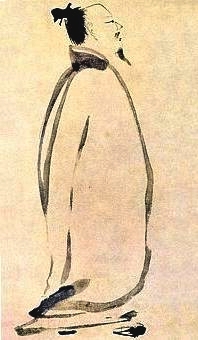
Gǔfēng wǔshíjiǔ shǒu zhī shísì
[anno 750]
Poesia dell’ “Immortale Poeta” cinese, la cui liberissima traduzione ad opera del poeta imagista statunitense Ezra Pound (1915) fu poi messa in musica dal compositore inglese Sir Granville Bantock (1923)
Testo trovato su The Lied, Art Song and Choral Texts Archive
“… E dolori, dolori come pioggia.
Dolore nell’andare e nel tornare.
Campi desolati, senza gioventù…”
Una poesia che mi pare possa bene accompagnarsi al Roman Wall Blues di Auden, il quale nel comporlo forse ebbe ben presente l’adattamento inglese di Ezra Pound dalla raccolta “Cathay” del 1915.
Il nome 李牧 (“Rihoku” nella trascrizione rōmaji utilizzata da Pound, da non confondersi con “Rihaku”, il nome dello stesso Lǐ Bái) ci consente di capire che la poesia racconta dell’era conosciuta come Periodo dei Regni Combattenti, quando nel III secolo avanti Cristo diversi... (continua)
[anno 750]
Poesia dell’ “Immortale Poeta” cinese, la cui liberissima traduzione ad opera del poeta imagista statunitense Ezra Pound (1915) fu poi messa in musica dal compositore inglese Sir Granville Bantock (1923)
Testo trovato su The Lied, Art Song and Choral Texts Archive
“… E dolori, dolori come pioggia.
Dolore nell’andare e nel tornare.
Campi desolati, senza gioventù…”
Una poesia che mi pare possa bene accompagnarsi al Roman Wall Blues di Auden, il quale nel comporlo forse ebbe ben presente l’adattamento inglese di Ezra Pound dalla raccolta “Cathay” del 1915.
Il nome 李牧 (“Rihoku” nella trascrizione rōmaji utilizzata da Pound, da non confondersi con “Rihaku”, il nome dello stesso Lǐ Bái) ci consente di capire che la poesia racconta dell’era conosciuta come Periodo dei Regni Combattenti, quando nel III secolo avanti Cristo diversi... (continua)
胡关饶风沙
(continua)
(continua)
inviata da Bartleby 8/11/2011 - 14:24
Todesfuge

CINESE / CHINESE / CHINOIS / KIINA
Versione cinese
Chinese version
Version chinoise
Kiinankielinen versio
Versione cinese
Chinese version
Version chinoise
Kiinankielinen versio
保罗·策兰 死亡赋格 Paul Celan - Todesfuge
高中毕业的那个暑假读到这首诗,北岛译的版本。那一个温热的午夜我吹着嗡嗡作响的风扇坐在一片寂静的黑夜中读着这首诗觉得浑身都在颤动。其实我没有,那只是一种你知道它不存在却又能体会到的幻觉。
我的书桌在六十瓦的台灯下反出一点黄色的光。风扇嗡嗡作响。我想,什么时候能读懂策兰原文就好了。
日子过的真快。快的我不想去想。
Da douban.com
高中毕业的那个暑假读到这首诗,北岛译的版本。那一个温热的午夜我吹着嗡嗡作响的风扇坐在一片寂静的黑夜中读着这首诗觉得浑身都在颤动。其实我没有,那只是一种你知道它不存在却又能体会到的幻觉。
我的书桌在六十瓦的台灯下反出一点黄色的光。风扇嗡嗡作响。我想,什么时候能读懂策兰原文就好了。
日子过的真快。快的我不想去想。
Da douban.com
死亡赋格
(continua)
(continua)
inviata da Riccardo Venturi 31/10/2011 - 21:13
L'Internationale

CINESE [3] / CHINESE [3]
L'autentica versione di Qu Qiubai (1923), segnalata da Xu Jiayu
The true version by Qu Qiubai (1923), contributed by Xu Jiayu
L'autentica versione di Qu Qiubai (1923), segnalata da Xu Jiayu
The true version by Qu Qiubai (1923), contributed by Xu Jiayu
"The version by Qu Qiubai, which is translated from the Russian version and came out in 1923. The Chinese(1) version, which is sung by most Chinese today, is not translated by Qu Qiubai, as showed on your site. In fact, it is very close to the Chinese(4) version, and was adapted and approved by the Communist Party of China in 1962, as a "official" version of the song." [XJ]
国际歌
(continua)
(continua)
inviata da Xu Jiayu 12/11/2010 - 12:17
Lili Marleen [Lied eines jungen Wachtpostens]
![Lili Marleen [Lied eines jungen Wachtpostens]](img/thumb/c1600_130x140.jpeg?1328915965)
CINESE / CHINESE
La versione cinese ripresa da questa pagina dedicata a Marlene Dietrich. Per la conferma dell'identità del testo ci siamo serviti della voce 莉莉瑪蓮 su zh.wikipedia. La presente versione è in caratteri semplificati. La trascrizione pinyin è stata fatta mediante il tool di Google Translator.
The Chinese version reproduced from this page dedicated to Marlene Dietrich. Lyrics identity has been confirmed by comparation with the article 莉莉瑪蓮 on zh.wikipedia. The present version is in simplified characters. Pinyin transcription made by using Google Translator tool. [CCG/AWS Staff]
《莉莉瑪蓮》(Lili Marleen)是一首在二次大戰兩方陣營中廣為流傳的德語歌曲。
歌詞由Hans Leip(1893-1983)寫於一次大戰中的1915年,他當時是一名被徵召到德軍俄國前線的漢堡教師。Leip組合了他女朋友與另一名女性朋友的名稱,即莉莉與瑪蓮,詩意地組合了莉莉瑪蓮這一個人名。這首詩後來以"Das Lied eines jungen Soldaten auf der Wacht"(《一個年輕的士兵值班之歌》)的名字出版。在作者Hans Leip與Rudolf zinc為這首詩加上音樂前,诺伯特·舒尔策(Norbert Schultze)早已於1938年為它譜曲。而Tommy... (continua)
La versione cinese ripresa da questa pagina dedicata a Marlene Dietrich. Per la conferma dell'identità del testo ci siamo serviti della voce 莉莉瑪蓮 su zh.wikipedia. La presente versione è in caratteri semplificati. La trascrizione pinyin è stata fatta mediante il tool di Google Translator.
The Chinese version reproduced from this page dedicated to Marlene Dietrich. Lyrics identity has been confirmed by comparation with the article 莉莉瑪蓮 on zh.wikipedia. The present version is in simplified characters. Pinyin transcription made by using Google Translator tool. [CCG/AWS Staff]
《莉莉瑪蓮》(Lili Marleen)是一首在二次大戰兩方陣營中廣為流傳的德語歌曲。
歌詞由Hans Leip(1893-1983)寫於一次大戰中的1915年,他當時是一名被徵召到德軍俄國前線的漢堡教師。Leip組合了他女朋友與另一名女性朋友的名稱,即莉莉與瑪蓮,詩意地組合了莉莉瑪蓮這一個人名。這首詩後來以"Das Lied eines jungen Soldaten auf der Wacht"(《一個年輕的士兵值班之歌》)的名字出版。在作者Hans Leip與Rudolf zinc為這首詩加上音樂前,诺伯特·舒尔策(Norbert Schultze)早已於1938年為它譜曲。而Tommy... (continua)
莉莉玛莲
(continua)
(continua)
inviata da Riccardo Venturi 7/9/2008 - 00:56
止戰之殤 [止战之殇] / The Wound That Ends War
![止戰之殤 [止战之殇] / The Wound That Ends War](img/upl/commonjasminorange.jpg)
[2004]
演唱: 周杰倫
附註:
作曲: 周杰倫
編曲: 周杰倫
填詞: 方文山
zhǐ zhàn zhī shāng
Lyrics by Fang Wengshan [Vincent Fang]
Music and Arrangement by Jay Chou
Album: 七里香 / Qī Lǐ Xiāng [Common Jasmin Orange]
演唱: 周杰倫
附註:
作曲: 周杰倫
編曲: 周杰倫
填詞: 方文山
zhǐ zhàn zhī shāng
Lyrics by Fang Wengshan [Vincent Fang]
Music and Arrangement by Jay Chou
Album: 七里香 / Qī Lǐ Xiāng [Common Jasmin Orange]
"The song 止战之殇 (The Wound That Ends War) is an anti-war song in 七里香 (Common Jasmin Orange), Jay Chou's fifth album." - Shangaiist
光 輕如紙張 光 散落地方
(continua)
(continua)
inviata da Riccardo Venturi 4/6/2008 - 02:30
L'Internationale

CINESE [5] / CHINESE [5]
La versione dell'Esercito Rivoluzionario Nazionale (1926). In occasione della commemorazione del 55° anniversario della Comune di Parigi, il 18 marzo 1926, l'Esercito Rivoluzionario Nazionale fece stampare uno spartito con tre strofe dell'Internazionale in lingua cinese, press'a poco corrispondenti alla prima, seconda e sesta strofa dell'originale francese di Eugène Pottier. In questa unica pagina riproduciamo sia il testo in caratteri tradizionali dell'epoca, sia quello in caratteri semplificati; segue la trascrizione in pinyin.
"La presente versione [...] è stata tradotta da 萧三 (Xiao San)(1896-1983), un poeta assai famoso, mentre si trovava nel 1923 a Mosca. È basata principalmente sulla versione originale francese, ma presenta anche diverse modifiche." [Xu Jiayu]
When commemorating the 55th anniversary of the Paris Commune on 18 March 1926, the National Revolutionary... (continua)
La versione dell'Esercito Rivoluzionario Nazionale (1926). In occasione della commemorazione del 55° anniversario della Comune di Parigi, il 18 marzo 1926, l'Esercito Rivoluzionario Nazionale fece stampare uno spartito con tre strofe dell'Internazionale in lingua cinese, press'a poco corrispondenti alla prima, seconda e sesta strofa dell'originale francese di Eugène Pottier. In questa unica pagina riproduciamo sia il testo in caratteri tradizionali dell'epoca, sia quello in caratteri semplificati; segue la trascrizione in pinyin.
"La presente versione [...] è stata tradotta da 萧三 (Xiao San)(1896-1983), un poeta assai famoso, mentre si trovava nel 1923 a Mosca. È basata principalmente sulla versione originale francese, ma presenta anche diverse modifiche." [Xu Jiayu]
When commemorating the 55th anniversary of the Paris Commune on 18 March 1926, the National Revolutionary... (continua)
a. Caratteri tradizionali
(continua)
(continua)
inviata da Riccardo Venturi 20/5/2008 - 15:07
Warszawianka 1905 roku [Варшавянка; La Varsovienne; ¡A las barricadas!]
![Warszawianka 1905 roku [Варшавянка; La Varsovienne; ¡A las barricadas!]](img/thumb/c6506_130x140.jpeg?1328189496)
2k. Traduzione letterale cinese*
2k. Chinese literal translation*
2k. Chinese literal translation*
《到街垒去》(西班牙語:A las barricadas),又譯作《向着街垒》、《走上街壘》,是西班牙內戰時期一首廣為流傳於當地無政府主義者之間的歌曲,由瓦萊里亞諾·奧羅蓬·費爾南德斯負責填詞。他在很大程度上參考了約瑟夫·普瓦文斯基為《華沙工人進行曲》創作的曲調,並於1933年開始重新填詞。至今它已成為了西班牙最為著名的工人歌曲之一,以及全國勞工聯盟(CNT)的會歌。
《到街垒去》的旋律改编自著名的波兰工人歌曲《華沙工人進行曲》。1885年3月2日华沙爆發示威後,这首歌便成為了當地反對俄國入侵的著名歌曲。1933年,參與了當時西班牙無政府主義運動的伊比利亞無政府主義聯合會在報章上刊出了一篇文章,於當中介紹《華沙工人進行曲》,使得其知名度大增。內文包含了安杰尔·米雷特所擇寫的混聲合唱樂譜、瓦萊里亞諾·奧羅蓬·費爾南德斯的西班牙語改編版本《到街垒去》,以及改編版本的起源。报道称,正在外遊中的德国无政府主义青年團成員兼無政府工團主義者阿尔弗雷德·舒尔特在洗澡時唱出了《華沙工人進行曲》,恰好被在場的全國勞工聯盟文化代表費爾南德斯聽見,於是他靈機一動,與他的妻子希爾德一起把其改編,以迎合西班牙的情況。
在西班牙內戰時期,《到街垒去》旋即取代《人民之子》,成為一首廣為流傳於當地無政府主義者之間的歌曲。1936年出現了首個錄製版本。當中由民間合唱團Orfeó Català主唱,弗朗切斯克·普約爾斯負責指揮。全國勞工聯盟因其具有一定知名度,而於最終把它定為會歌。它在佛朗哥的獨裁統治下仍沒失傳。2009年,全國勞工聯盟為紀念成立100週年,而重新錄製了《到街垒去》。- zh.wikipedia
《到街垒去》的旋律改编自著名的波兰工人歌曲《華沙工人進行曲》。1885年3月2日华沙爆發示威後,这首歌便成為了當地反對俄國入侵的著名歌曲。1933年,參與了當時西班牙無政府主義運動的伊比利亞無政府主義聯合會在報章上刊出了一篇文章,於當中介紹《華沙工人進行曲》,使得其知名度大增。內文包含了安杰尔·米雷特所擇寫的混聲合唱樂譜、瓦萊里亞諾·奧羅蓬·費爾南德斯的西班牙語改編版本《到街垒去》,以及改編版本的起源。报道称,正在外遊中的德国无政府主义青年團成員兼無政府工團主義者阿尔弗雷德·舒尔特在洗澡時唱出了《華沙工人進行曲》,恰好被在場的全國勞工聯盟文化代表費爾南德斯聽見,於是他靈機一動,與他的妻子希爾德一起把其改編,以迎合西班牙的情況。
在西班牙內戰時期,《到街垒去》旋即取代《人民之子》,成為一首廣為流傳於當地無政府主義者之間的歌曲。1936年出現了首個錄製版本。當中由民間合唱團Orfeó Català主唱,弗朗切斯克·普約爾斯負責指揮。全國勞工聯盟因其具有一定知名度,而於最終把它定為會歌。它在佛朗哥的獨裁統治下仍沒失傳。2009年,全國勞工聯盟為紀念成立100週年,而重新錄製了《到街垒去》。- zh.wikipedia
到街壘去 [1]
(continua)
(continua)
inviata da Riccardo Venturi 12/10/2007 - 23:58
Bella Ciao
anonimo

19a. A péngyǒu zàijiàn (Versione cinese traslitterata "Pinyin"
19a. A péngyǒu zàijiàn ("Pinyin" Romanized Chinese version)
19a. A péngyǒu zàijiàn ("Pinyin" Romanized Chinese version)
La trascrizione Pinyin, inserita in un primo momento dalla versione fornita su Wikipedia, è stata rifatta con l'ausilio di Google Translator, che la effettua molto più esatta (indicazione dei toni). La traduzione letterale inglese della versione (con l'aggiunta dell'ultima stofa, usualmente mancante) è stata mantenuta.
The Pinyin transcription, first included in the version given by Wikipedia, has been changed with the help of Google Translator tools, that are much more precise (indication of Chinese tones). The English literal translation (with addition of the usually missing last verse) has been maintained. (AWS/CCG Staff)
The Pinyin transcription, first included in the version given by Wikipedia, has been changed with the help of Google Translator tools, that are much more precise (indication of Chinese tones). The English literal translation (with addition of the usually missing last verse) has been maintained. (AWS/CCG Staff)
Nà yītiān zǎochen, cóng mèng zhōng xǐng lái
(continua)
(continua)
inviata da Riccardo Venturi 19/9/2007 - 01:44
放炮 [Bombing]
编曲:Cooliang
填词:梁文涛
演唱: Douglas Liang
制作:Cooliang
Arrangement: Cooliang
Lyrics: Wen-Tao Liang
Album: Douglas Liang
Production: Cooliang
填词:梁文涛
演唱: Douglas Liang
制作:Cooliang
Arrangement: Cooliang
Lyrics: Wen-Tao Liang
Album: Douglas Liang
Production: Cooliang
Lyrics are reproduced from this page, where also a direct link to the YouTube video is available. By the title, it is clearly an antiwar song although we don't understand a single word of the lyrics; any Chinese translator will be welcome. [RV]
背上佩枪,带起军帽,他们以为很帅,其实傻冒.
(continua)
(continua)
inviata da Riccardo Venturi 14/5/2007 - 22:24
加入到遠征軍
anonimo

Jiārù dào yuǎnzhēng jūn
"Here is a Han poem taken from Chinese Poetry: Major Modes and Genres edited and translated by Wai-lim Yip with calligraphy by Kuo-hsiung Chen. (University of California Press, 1976.) [...] The poem is from the Yüeh-Fu collection of ballad-songs collected by the imperial Music Bureau during the Han Dynasty. The accompanying music is now lost."
(From: World Poetry Translation)
Il seguente testo proviene dalla "Collezione Yüeh-Fu" di ballate e canzoni raccolta dall'Ufficio Musicale Imperiale durante la dinastia Han. Poiché la dinastia Han regnò in Cina dal 202 a.C. al 220 d.C., la seguente è indubbiamente la canzone contro la guerra più antica di tutta la raccolta, e una delle più antiche mai scritte. Perché di una componimento musicale vero e proprio si tratta, pur essendo la musica purtroppo andata persa; ciò è confermato di per sé dalla sua appartenenza ad una... (continua)
"Here is a Han poem taken from Chinese Poetry: Major Modes and Genres edited and translated by Wai-lim Yip with calligraphy by Kuo-hsiung Chen. (University of California Press, 1976.) [...] The poem is from the Yüeh-Fu collection of ballad-songs collected by the imperial Music Bureau during the Han Dynasty. The accompanying music is now lost."
(From: World Poetry Translation)
Il seguente testo proviene dalla "Collezione Yüeh-Fu" di ballate e canzoni raccolta dall'Ufficio Musicale Imperiale durante la dinastia Han. Poiché la dinastia Han regnò in Cina dal 202 a.C. al 220 d.C., la seguente è indubbiamente la canzone contro la guerra più antica di tutta la raccolta, e una delle più antiche mai scritte. Perché di una componimento musicale vero e proprio si tratta, pur essendo la musica purtroppo andata persa; ciò è confermato di per sé dalla sua appartenenza ad una... (continua)
inviata da Riccardo Venturi 12/3/2007 - 01:17
×
![]()

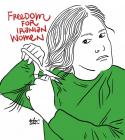
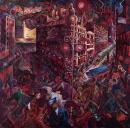

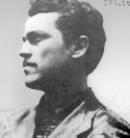









![Soldadito Boliviano [Guitarra en duelo mayor]](img/thumb/c2016_130x140.jpeg?1328130381)
